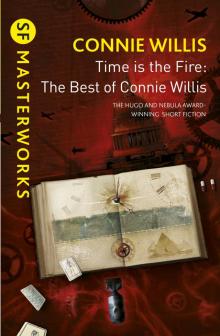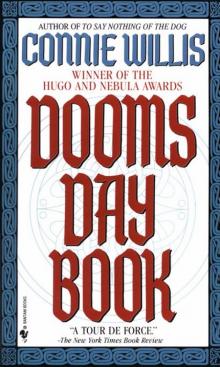- Home
- Connie Willis
Water Witch Page 11
Water Witch Read online
Page 11
Harubiki looked at Radi sharply as he shook his head in answer to his own question.
“He may be in suspense,” Radi said, “but I suspect he’ll arrange to be far away from the compound today.”
With no trace of remorse in her beautiful face, Harubiki secured the sheet by tying it several times around with the curtain sash. When she was satisfied that nothing would come undone, she gestured for Radi to pick up the corpse from the shoulders. Together they carried him to the slipspace.
Chappa dead seemed heavier than Chappa alive could have been. Even so, Radi might have managed to carry him over his shoulder if the overhead clearance in the slipspace passages hadn’t been so low. With a great deal of difficulty in simultaneously maintaining their holds on the body and pocket-flares, they finally made their way off the solid wood stairs and into the caverns beneath the house. They went past the slipspace to the control room where Radi and Chappa had halted the computer-controlled listeners only last night. Now Harubiki took the lead, for she had explored these caverns more thoroughly than he when she found her way to the barn.
“If we can get this load into the loft,” Harubiki said, “we can lower it outside the compound wall with the block and tackle they use to haul up fodder bales.”
“You said there were guards.” Radi paused in the passageway.
Harubiki was looking at him impatiently.
“I got out, didn’t I? Surely my teacher in the arts can equal my feat in reverse.”
“Should have taught you the art of civility, as well. I don’t like what we’re doing any more than you. Chappa is entitled to a more honorable burial, but I don’t doubt for one second that he’d understand the necessity of this and approve of it, if he but could.”
“I do not care how we dispose of Chappa, only that we do it quickly and quietly… so that we may return before evening prayers,” she said, then added solemnly, “It must be dawn already.”
Radi sighed. She’d always been hard, a quality he remembered admiring. But she’d been loyal, too, and that he had always thought included respect for friends, dead or alive. It seemed he was wrong in that, but at least he could count on her to carry her end of the burden without complaint. They moved along, trying not to trip on the rough-cut stone.
“I smell mbuzim,” Radi said, wrinkling his nose as they turned out of a chiselled corridor and into a natural one.
“The barn’s just up ahead, and I do mean up,” Harubiki said, tugging at her end of the corpse and shining her pocket flare up a steep tunnel to show what she meant. The tunnel had been blasted through the wall of the cave.
“I smell mbuzim here,” Radi said, tucking the dead man’s knees under one arm so that he could shine his light around the walls. He spotted exactly what he expected; a rope ladder leading to a trapdoor above him. “Just a second. I’m going up to take a look.
“Radi, we can’t wait.”
But Radi had already set down his burden and was halfway up the ladder. At the top, he eased up the trapdoor a crack and peered into a well-lighted stable. The smell of horsedroppings and fresh woodchips assaulted him, but not the stinging musk of the mbuzim. There were two ponies in the aisle crossties, their cream-colored hides curried and brushed to a high gloss. One was saddled with ordinary leather tack, the other with the appointments of a high-ranking nomad chieftain, complete with browband of inlaid gembone, braided reins, gem-studded breastplate and colorful martingale. The saddle was a heavy, plain-skirted one padded and lined with tissue-thin leather, with flask and sandwich-case fastened on the front. Plainly the Tycoon was going for a ride in the desert, which didn’t surprise Radi at all. The man wouldn’t, after all, care to be around when the priest’s body was found. What did surprise Radi was the number of ponies still stabled. Each of these foreigners’ households had stout ponies for every man, and perhaps a cob or two for the ladies of the house or for servants’ use. But this stable was huge! There were more than forty stalls on this aisle alone, twice the number he would have guessed from the outside of the stable. Most of it was underground, hidden; from his perch on the ladder he couldn’t see how many more aisles there might be. What ever could the man be doing with so many ponies? No wonder he needed more water than the City could account for each pony probably consumed fifteen or twenty gallons a day.
Radi was sorely tempted to crawl through the trapdoor to see just how many more ponies there were and if their number was, indeed, great enough to account for the Tycoon’s water demands when a groom came scurrying around the corner from the end of the aisle.
“He’s coming,” the man shouted to companions unseen by Radi. Instantly Radi heard the sound of running footsteps coming toward him. He hadn’t even closed the crack when a heavily booted foot hit the trapdoor and did it for him. He dropped down the ladder to the passageway below where he found Harubiki glaring at him.
“This way,” she hissed, then took up her end of the corpse again.
The passage floor was suddenly slick, almost as if it were heavily used and the smell of mbuzim stronger, or maybe he just noticed the smell more because he had to breathe so deeply; the way was steep, the load heavy. It seemed an eternity before they reached the higher passages again and he saw the familiar slot that indicated a slipspace. Harubiki stopped.
Radi opened the slipspace just in time to see the creamy flash of a pony’s tail that was braided with the same bright colors as the martingale on the Tycoon’s pony as it was led out of the barn. He thought he’d seen the wife’s silhouette in a shadow, and he closed the slipspace to wait for her to follow the ponies outside. When Radi opened the door again, the barn looked empty. He motioned for Harubiki to help him ease the shrouded body through the slender notch, and once inside the barn, he hoisted the whole load to his shoulder.
The barn was as it seemed from outdoors. There was just enough room for two dairy cows’ stalls, a manger where two mbuzim as pampered and showy as Deza’s were tied, and a feed bin filled this morning with tons of rock. The wife hadn’t stinted on the rocks in hopes of finding her geodes; curious now, Radi took a few steps toward the bin when he heard Harubiki ‘s warning hiss. He dove behind a water trough, banging his knees but managing to keep his burden balanced. Harubiki was only feet away from him, crouching behind grain sacks, her fingers pressed to her lips for silence. He kept silent, but he heard nothing. He kept his eyes on Harubiki, knowing she must be able to see some danger that he could not. When minutes had passed and his feet were getting numb, she finally gestured him to the loft ladder. This time Radi made no detours.
The loft floor was shiny, polished by fodder bales and sacks of woodchips being dragged to and fro. The loft door was open to the brilliant desert sky, a welcome sight. Even so, Radi stepped cautiously to the opening, watching carefully for signs of guards or servants as the scope widened with every step. The way was safe, empty. There was a track that meandered in from the desert, branching to the little barn at the edge of the compound where carts were unloaded by a block and tackle. There was no ladder down to the desert floor, and it was too far down to jump safely. Yet Radi was surprised to find the Tycoon’s compound exposed as much to determined penetration as to motivated exit.
“They keep this place guarded,” Harubiki said, helping Radi put the body down. She shook a strand of silken hair off her cheek and smiled. “But it will be a long time before they find out what happened to the morning guard.” She gestured to the rafter-high bales of fodder behind her. “If you’re careful, you can pull out the bales from the bottom and the upper ones remain in place. I tunneled in about eight bales.” She didn’t seem to be able to help her self-satisfied grin, and Radi couldn’t help but smile, too, even though he knew that the inevitable stench from the dead guard would demand investigation long before the cows and mbuzim would have eaten enough hay to cause discovery of the body. It was possible that Harubiki just didn’t know; a body secreted in the remote caverns of the City in the Red Cave was mummified in the cool, dry air. Life was dif
ferent on the planet surface, and though Radi had arranged for Harubiki to spend time with a band of nomads, he knew now that she had not learned everything there was to know.
When they lowered the body out the door, it was shrouded in dun-colored gunny sacks. Once it was down on the dust and rocks, Radi got ready to climb down the tackle rope. He hesitated when Harubiki rolled a wheelbarrow out from behind a pile of grainsacks they had raided for Chappa’s new and less noticeable shroud. “What are you doing with that?” he asked.
“Would you prefer carrying the body on your back out to the desert?”
“Of course not,” Radi said, really getting irritated with her arch tone. “I had already decided that it was your turn.”
With that, he slid down the ropes a bit too fast, burning his hands. He unfastened the hook from the sacks around Chappa and stood by as Harubiki lowered the wheelbarrow. He also looked on while she struggled to get the body into it, and he certainly didn’t offer to take one handle when it finally was time to go. He just pulled the hood of his priest’s robe up over his head to protect him from the sun as he walked along the dirt track.
Outside the compound as they were, Radi was not particularly concerned about being discovered. Guards on the masonry wall surely would see them, but they weren’t worth more than casual notice. At this distance they’d seem nothing more than a couple of natives walking away from the compound. There were true surface natives, one-time nomads who had built houses right outside the compound walls and gratefully accepted the water the Tycoon doled out. When one of them was about to pass too close, he and Harubiki simply stepped off the path and turned away, as if they were resting a moment. But while the presence of natives made it easy to pass through the vicinity of the compound unnoticed, it did, he realized, present another problem. They couldn’t go terribly far into the Tegati Desert on foot; even if they pushed on until late afternoon with all possible speed, they couldn’t be positive they’d not be observed while digging the grave. Anyplace they could walk to within half a day of the Tycoon’s compound would have some people about, even if it was a simple shepherd child watching over a flock of clip-winged guli birds while they picked mites and other insects off the sparse and tough vegetation. They should have headed for the karstlands, he realized too late, where few people ever went. But those were on the far side of the compound, and he couldn’t risk a trek around. Radi shielded his eyes against the quickly climbing sun. There were occasional stands of rocks, and they might use the cover those would offer while they dug. But rocks exposed were, he knew, usually just the tops of even bigger rocks, covered by sand and dirt. A clump of trees, stunted as they were in this area, was best; they’d give cover and provide soil soft enough to dig deep. But any within walking distance to the compound was likely to be at least temporarily inhabited by natives combing the waxy green vegetation for kala nuts and asetely berries. Digging out in the open was out of the question. No one would stop them; but anyone who happened to see them at their labors was sure to come back after dark and dig up the valuables. He’d just about decided to hide Chappa ‘s body high in some rocks instead of burying it at all, when Harubiki stopped short in the road.
“What’s that?” she said.
“What?” Radi asked. He could see only a clump of shrubs and devil bushes off to the left and the promising rocks beyond.
“Listen,” she said.
Then he heard it. A sound something like the wind, but too high-pitched and far more unnerving. His skin popped goose flesh just as soon as he recognized it. “Singing snake,” he said.
“Here?” she said.
“Where do you think the snakes in Sheria’s receiving chamber came from?”
Harubiki mopped her sweating brow with the back of her hand. “I never heard those make a noise before.”
“That’s its striking song.”
She looked so unconcerned. It was becoming obvious to Radi that he should have seen to every facet of Harubiki’s training himself, even her surface training. This woman who did not have enough knowledge to fear a singing snake was the person to whom he had entrusted Sheria’s life. True, he was certain no one would live to enter the princess’s chamber unwanted, and Sheria was not likely ever to need to leave the City. But the City’s ruler needed a bodyguard who could cope with any situation, one without limitations.
“The singing snakes Sheria keeps are worms compared to the ones that live in the wild,” he said. “The big ones have enough poison to kill a chuma cat. The death is painful, and agonizingly slow.”
“The death may be slow, but so is the snake. I am quick, Radi, too quick for one of them.”
“Sheria’s pets are always torpid because the caves are cool. Up here the singing snakes move swiftly, even quickly enough to catch you, my quicksilver friend.”
Finally Harubiki frowned. “How big are they?” she asked looking at the thicket with considerable respect.
“No longer than my arm, and no thicker than your little finger.”
“That’s not so large; it couldn’t eat a chuma cat. A cave bui is swift and its poison can kill a man, but at least the bui eats its prey … and its children eat, and the children’s children.”
“No one ever said a singing snake was ecologically efficient. They happen to be attracted to anything warm-blooded, frenzied, really. Usually anything bigger than a mouse is smart enough to keep clear of the song.”
“You’d think it wouldn’t sing, so that even a mouse wouldn’t know it was coming.”
Radi looked at her gravely. “The singing snake never comes from where you hear the song. The poison is deadly, but it’s listening to the song that kills you. The snake has air sacks that open to where it has been rather than ahead, and the whipping motion it makes with its tail distorts the sound.” Even as he spoke, the snake’s song had moved to the far edge of the grove, but with nothing in between, no time, no gradation of sound.
“Are you thinking, Radi, that if everyone fears this singing snake, no one will be in this grove?” She smiled slyly.
Surface experience or not, Harubiki’s mind worked like Radi’s. She too was worried about being seen burying the body. “We should fear the singing snake, too,” he said.
“I do not,” she said, turning the wheelbarrow purposefully toward the grove.
“Harubiki,” he called. She stopped and looked back at him. “We’ll take turns guarding.” She nodded and continued.
In the grove, they found a patch of clear and slightly loose ground. Radi started digging, regretting that making Harubiki push the wheelbarrow gave him first turn at the shovel. “Watch high and low,” he warned her. “And remember especially to keep your eyes away from where the song seems to be coming from.”
“It seems to be coming from everywhere,” she said, sounding a little hesitant for the first time.
“I know,” he said. “That’s what makes it so deadly.” Doggedly he dug and pitched aside spadesful of sandy loam. He noticed that Harubiki had produced a laser handgun from somewhere inside her loose blouse; he was surprised. He hadn’t realized there was one among them, believed they’d all been lost with the majini. But its presence in her hand made him inclined to dig a little longer than he might have otherwise. Harubiki was better with a laser than he, her aim more precise whether wide beam or narrow, and he was stronger and therefore better suited to shoveling.
When Radi was standing in a hole up to his thighs, Harubiki said, “That’s enough, Radi.”
“Agreed,” he said, gratefully standing the spade in the pile of loose earth. He was reaching for the handgun, oddly just completely unable to react with anything except confusion when he realized the sighting tube was aimed at him.
“Don’t bother to step out,” she said, her voice as deadly as the whistle of the singing snake. “Just sit down and get the feel of the grave you have dug for yourself.”
Her steely eyes took away any doubts that he had, but not the confusion. “Why? What possible motive could you have f
or wanting to kill me? I know that you, of all people, have not sold out to the Tycoon.”
“Turn around,” she said, “and stop talking. You know that tactic is useless on me. I can’t be distracted from the job at hand; my teacher saw to that.”
He turned slowly, wishing he’d been a little less thorough. He couldn’t remember anything he hadn’t taught her about a situation like this, except, perhaps the singing snake. “The song is distant again,” he said. If she had replied, he might have taken his chances in jumping for her, but she merely pulled a rope from beneath her blouse and clenched one end between her teeth. With a single hand, she tied his wrists behind his back in the very fashion that he himself had taught her. It would take hours to wriggle loose.
“Sit down,” she commanded, pulling his pocket flare and dagger from his belt.
Reluctantly he did so, and with proper caution she bound his legs as well. Not completely satisfied, she arranged a few slip loops around his neck so that any violent struggle would choke him. It was little comfort at this moment to realize that she probably did not intend to kill him right away, for when she started kicking dirt onto him, filling in the hole, he decided she must mean for him to die of suffocation.
“How will you explain your betrayal to Sheria?” he said.
“If you had died on the majini as she wished, you would have saved me more explanation than I shall have to do now.”
“She? Who has bought your loyalty and made you betray the City?” he demanded.
Harubiki pushed more dirt onto him with her foot, not speaking again until he was buried up to his neck. Then she said, “My loyalty is where it always has been, with the princess.”
“I don’t believe.”
But Harubiki cut him off. “It is she, with my help, who will make the City strong, and no place for debauchers like you. Did you believe that she didn’t understand the amount of power the foreigners like the Tycoon could hand over to her? Did you believe she’d stand by helplessly while you interfered in her plans?”

 Passage
Passage Bellwether
Bellwether Blackout
Blackout Doomsday Book
Doomsday Book A Lot Like Christmas: Stories
A Lot Like Christmas: Stories Water Witch
Water Witch To Say Nothing of the Dog
To Say Nothing of the Dog Fire Watch
Fire Watch The Winds of Marble Arch and Other Stories
The Winds of Marble Arch and Other Stories Uncharted Territory
Uncharted Territory All Clear
All Clear Crosstalk
Crosstalk Lincoln's Dreams
Lincoln's Dreams Miracle and Other Christmas Stories
Miracle and Other Christmas Stories Time is the Fire
Time is the Fire Blackout ac-1
Blackout ac-1 Dooms Day Book
Dooms Day Book Jack
Jack The Doomsday Book
The Doomsday Book Terra Incognita
Terra Incognita The Best of Connie Willis
The Best of Connie Willis Cibola
Cibola Schwarzschild Radius
Schwarzschild Radius Even the Queen
Even the Queen The Last of the Winnebagos
The Last of the Winnebagos Spice Pogrom
Spice Pogrom Oxford Time Travel 1 - Blackout
Oxford Time Travel 1 - Blackout At The Rialto
At The Rialto A Lot Like Christmas
A Lot Like Christmas